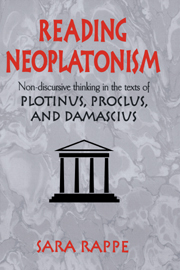Book contents
- Frontmatter
- Contents
- Preface: Discursive Strategies and Neoplatonic Texts
- Acknowledgments
- List of Abbreviations
- 1 Introduction. Representing a Tradition: Exegesis, Symbol, and Self-reflection
- PART I LANGUAGE IN THE ENNEADS
- PART TWO TEXT AND TRADITION IN NEOPLATONISM
- References
- General Index
- Index Locorum
1 - Introduction. Representing a Tradition: Exegesis, Symbol, and Self-reflection
Published online by Cambridge University Press: 24 October 2009
- Frontmatter
- Contents
- Preface: Discursive Strategies and Neoplatonic Texts
- Acknowledgments
- List of Abbreviations
- 1 Introduction. Representing a Tradition: Exegesis, Symbol, and Self-reflection
- PART I LANGUAGE IN THE ENNEADS
- PART TWO TEXT AND TRADITION IN NEOPLATONISM
- References
- General Index
- Index Locorum
Summary
Reading Neoplatonism touches on issues as diverse as Plotinus' critique of essentialism and Proclus' references to theurgy. What brings these strands of thought together, and how can a scholar justify tracing these disparate phenomena back to a single source? In this book, I claim that the wide variety of textual strategies we find in the Neoplatonic tradition arises largely as a means of circumventing the hestitations that the tradition as a whole has about discursive thinking. There is a diachronic movement to the book: I begin at the start of the Neoplatonic tradition and end with the last Platonic successor, Damascius.
What makes Neoplatonism a unified tradition, and what kinds of resources enabled Neoplatonists to maintain the continuity of this tradition? Formally, Neoplatonists remained allied over the acceptance of Plato's dialogues as constituting something like a foundational discourse. Yet obviously there is a great deal more to the tradition that brought about its cohesion, above all its metaphysical structures and its associations with pagan religiosity. In short, Neoplatonism was a textual tradition as well as a living school; its adherents practiced a minority religion that struggled to define and maintain itself against an increasingly intolerant mainstream ideology.
But if the Neoplatonists rely on the writings of Plato for their metaphysical enterprise, the central feature of this enterprise is nevertheless its insistence on the faculty of intuition, nous, for the truth of its deliverances.
Information
- Type
- Chapter
- Information
- Reading NeoplatonismNon-discursive Thinking in the Texts of Plotinus, Proclus, and Damascius, pp. 1 - 22Publisher: Cambridge University PressPrint publication year: 2000
